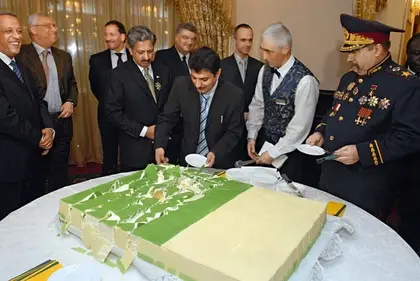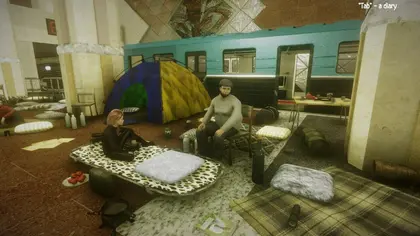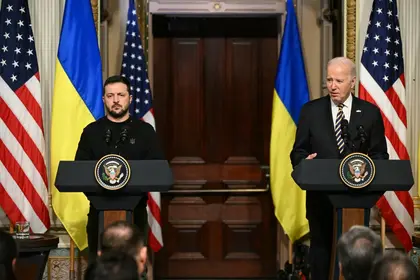Even the estimated 1,000 Pakistanis living in Ukraine are separated from each other, geographically, by income and for other reasons.
However, on March 23, the community united to celebrate Pakistan Day. The holiday commemorates “The Pakistan Resolution” passed in 1940, when Muslims of the Indian subcontinent set out to create an independent state, a nation where they could live according to their religion and culture. That event laid the keystone for the independent nation of Pakistan, established in 1947.
Some Pakistanis in Ukraine are affluent and successful; many others are not noticeable to the public. Three large companies in Ukraine have Pakistani owners, including the ISTIL Group, whose owner, Mohammad Zahoor, publishes the Kyiv Post. The others are Sabina Pak Ltd., a steel trader, and Herbion, a pharmaceuticals importer.
In 1996, Ukraine signed a $650 million contract to export 320 T-89UD tanks to Pakistan. The arms trade remains active today.
Other Pakistani nationals run large companies and small kiosks. They import rice and fruit. Some live as illegal immigrants. Some come for education. However, while there are 2,000 Indian students in Ukraine, a legacy of special India-Soviet ties, the number of Pakistani students is believed to be no more than 200, since Pakistan aligned with the West during the Cold War.
Many Pakistanis in Ukraine keep close ties with foreigners from Turkey, Arab nations and, of course, Indians – a people of great cultural proximity, yet religious differences with Pakistan.
Those who come and go
Probably one of the most successful Pakistani top managers in the nation, Nadir Shaikh, the country officer for Citibank, managed to increase his firm’s business sevenfold in the last six years. Shaikh is on the way out, however, enjoying his last days in Kyiv before transferring to London.
“Back in 2004, Ukraine was very closed and the banking sector was undeveloped,” Shaikh said. “However, opportunities were huge. There was so much we could bring in, which we did,” Shaikh said.
From the 2004 democratic Orange Revolution to the more recent economic crisis and political chaos, Shaikh claims Ukraine has been “going two steps forward, one step back” and all the while unpleasantly surprising us with new rules and regulations. He calls Ukrainian bureaucracy “one of one of the worst.”
Shaikh managed to do business, nonetheless. “You don’t overcome the bureaucracy, you have to work with bureaucracy and comply with it; you cannot really go around,” he said.
Shaikh witnessed the generational gap between young Ukrainians “who really want to be Western” and an older generation “stuck in the Soviet mentality.” Shaikh will miss the place, interesting for its “volatility and challenge.”
Others landed in Ukraine in the middle of a crisis.
“When I came in 2008, my predecessor assured me that business was going great,” said Umar Saeed, head of the representative office of the Herbion pharmaceutical company. Within months, economic crisis and political instability hit. Saeed had experience in the region, having spent time in Russia. In both places, he drew on his Moscow education from the 1990s.
He favors Ukraine over Russia because Ukrainians are “generally not as rough and complicated” as Muscovites. Visa policies are, however, hard. “My wife got a single entry visa to Ukraine. She cannot leave the country, cannot accompany me for the international trips, etc,” Saeed said.
Those who stay
Farooq Siddiqui was among the few Pakistanis who studied in the Soviet Union during the Cold War in the 1970s. He has also greatly benefited from the language skills and knowledge he gained then. Now he is chief operating officer of production and trading at ISTIL Group, the diversified Zahoor holding that has media, real estate and other assets.
“There is very big money circulating in Ukraine,” Siddiqui said. “You can either make a lot or lose everything. Those foreigners who have watched their business closely, succeed; those who just invest and rely on local partners tend to lose. In the United States, you can trust your company to a local representative and still make money. In Ukraine, you have to be on top of things.”
Every successful expatriate has their own recipe for coping with bureaucracy and fraud.
“The key is establishing personal contacts. The mistake many foreign businessmen make is solving problems through their employees and not directly contacting locals,” said Hanif Younus, a Pakistani national who spent 12 years working in the banking industry in Ukraine. He worked in Moscow in 1994 before moving to Ukraine, where life has been mostly smooth sailing.
Younus was an observer during the 2004 presidential elections and was impressed by how welcoming eastern Ukrainians were to him.
Those who learn
Ibrahim Muhammad, one of the estimated 200 Pakistani students in Ukraine, tried his luck here after getting rejected from a medical university in Pakistan. Just like other non-white communities, Pakistani students are vulnerable to racism. Muhammad’s Pakistani friend was attacked by a street gang in a part of Kyiv. Muhammad has also encountered minor problems in public.
Overall, however, Muhammad said: “To be honest, I am happy to be here. This country gives me education, a bed and breakfast, I breath Ukrainian air and I am very grateful for that.”
Those who won’t return
Many Pakistani nationals residing abroad may never return to live in their homeland. The country has struggled with terrorism, which dramatically spiked in recent years, partly due to Pakistan’s involvement in rooting out extremists in neighboring Afghanistan. Pakistan is an ally of the United States, providing logistical and other help. Afghanistan, ruled by the Islamic Taliban from 1996 until their over overthrow in 2001, is a hotbed of violence and instability that spills into Pakistan. In 2009, some 3,300 people in Pakistan were killed by terrorist attacks linked to the Taliban.
“The situation is not getting any better and it does not make any sense to fight the Taliban. They must sit down at the negotiating table. It’s the only solution,” said Kyiv Post publisher Zahoor. The Pakistan native has made Ukraine his home and doesn’t visit his native land often. The threat of terrorism is a deterrent. “However, it’s only us who live abroad who are so cautious,” Zahoor said. “Those who actually reside in Pakistan continue to live their lives. A human being gets used to everything.”
Kyiv Post staff writer Nataliya Bugayova can be reached at [email protected].
Read also ‘‘Pakistan ambassador: Trade deals slowed by bureaucracy‘ by Nataliya Bugayova.
You can also highlight the text and press Ctrl + Enter







Comments (0)